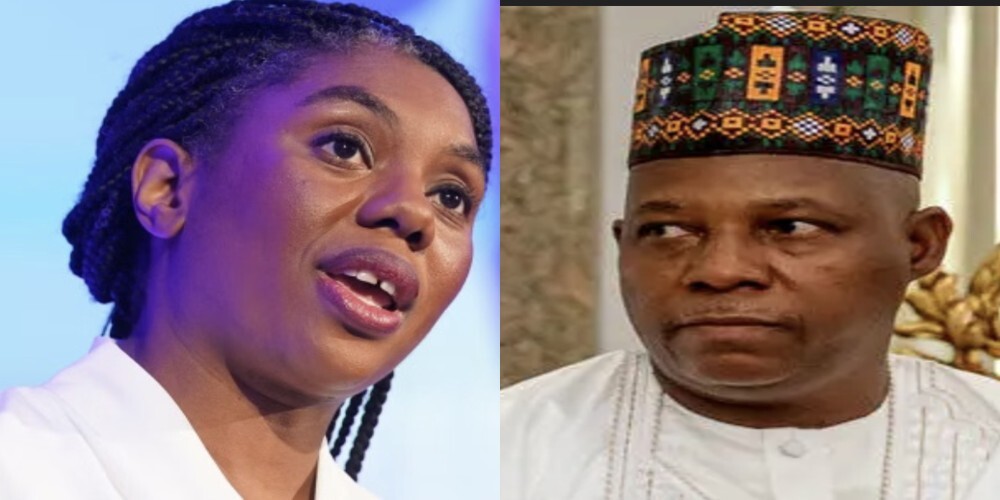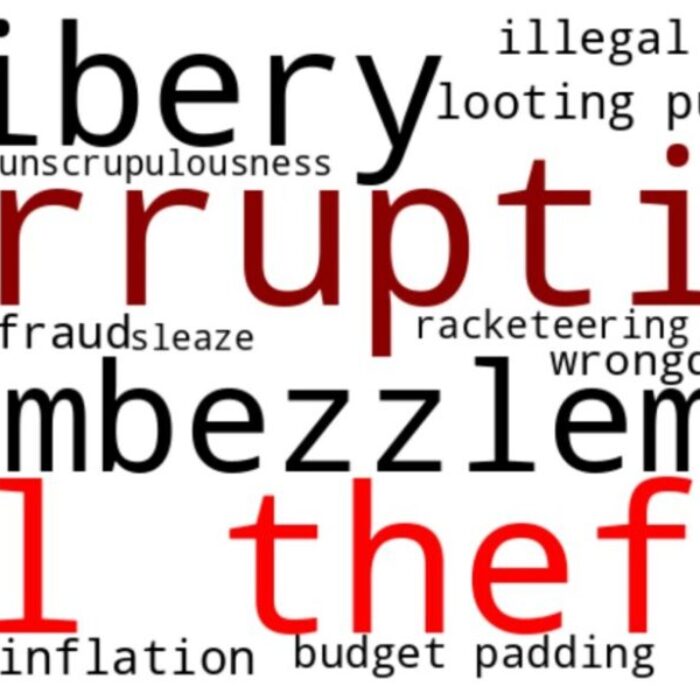By Nnaoke Ufere, PhD
During a recent speech on migration in Abuja, Vice President Kashim Shettima took a cheap shot at Kemi Badenoch, the UK’s Tory leader, for her critique of Nigeria’s corruption and insecurity. In an attempt to defend the indefensible, he declared, “The greatest Black nation on earth is the nation called Nigeria.” Yes, you heard him correctly!
For context, at the Conservative Party Conference, Badenoch contrasted her freedoms in the UK with the chaos she experienced during her childhood in Lagos. She described Nigeria as a place of rampant corruption and lawlessness, where “almost everything seemed broken.” Her words struck a nerve, prompting the Tinubu administration to send VP Shettima to respond defiantly and triumphantly.
Let me state this with absolute clarity and conviction before presenting my case: Mr. Vice President, understand this irrefutable truth—when we speak out or write about the harrowing realities of our beloved nation, when we hold its leaders accountable, or when we expose its systemic failures, it is not an act of rebellion, hatred, or disloyalty. It is a declaration of unwavering love for our country and its people.
Criticism driven by integrity and purpose is the highest form of patriotism. When we demand change and insist on accountability, we embody a fierce devotion to our nation—a love so profound that it cannot tolerate mediocrity, corruption, or injustice. Real progress is born not from suppressing dissent but from confronting the uncomfortable truths that hold us back. Silence protects the status quo; truth paves the way for transformation.
To dismiss or shame voices like Kemi Badenoch’s is to deny the lived realities of countless Nigerians. It is to perpetuate the very cycles of dysfunction that keep our nation from realizing its immense potential.
Before we rush to defend our nation’s greatness, we must first confront a critical question: have we truly earned that title? Greatness is not proclaimed; it is proven through the lives we uplift, the freedoms we guarantee, the justice we uphold, and the opportunities we create for our people to thrive.
Now, back to my case.
What exactly did Badenoch say that was untrue or inflammatory? Was she wrong to call out the harsh realities of Nigeria as they are? Or is the Tinubu administration once again showing its intolerance for criticism, even when its failures are glaringly evident?
This appears to be yet another attempt to stifle dissent and silence legitimate critiques, both at home and abroad. Efforts to contact the Vice President’s office for comments on this article were not successful.
A Reality Check: Nigeria’s Rankings on Global and African Indices
Before addressing Shettima’s defensive rhetoric, it is important to evaluate Nigeria’s standing on key global and African indices to scrutinize his claim that Nigeria is the “greatest Black nation on earth” in light of Badenoch’s criticism.
The evidence is compelling, exposing the arrogance of this administration and the hollowness of such a grandiose claim. In truth, it’s a technical knockout—Badenoch decisively outmatched Shettima. She spoke the truth—plain and undeniable—recognized by both Nigerians and the world.
On Development and Poverty:
Nigeria ranks 161st out of 191 countries on the Human Development Index (HDI), placing it firmly in the low human development category. Among African nations, Nigeria ranks 27th out of 54 countries, trailing behind Ghana (16th in Africa) and Kenya (21st in Africa). The Inequality-adjusted HDI (IHDI) further highlights severe disparities, with a 32.7% loss in development due to inequality in income, education, and healthcare. Even among African nations, Nigeria performs poorly on this adjusted index, indicating systemic inequities.
On Poverty:
Poverty is pervasive: 33% of Nigerians—over 70 million people—live in multidimensional poverty, a stark contrast to better-performing African countries like Ghana and Rwanda, which have made strides in poverty reduction. For a nation with such vast resources, this level of deprivation is not greatness but a tragedy.
The Legatum Prosperity Index, which measures overall prosperity, ranks Nigeria 149th out of 167 countries globally and 33rd in Africa, further illustrating the nation’s struggles with governance, economic stability, and social development; not a mark of greatness among black nations.
On Economic Mismanagement:
The Misery Index, a measure of economic hardship, paints a damning picture. In 2023, Nigeria’s Misery Index soared to 73.05%, up from 61.15% in 2021. This is one of the highest in Africa, surpassed only by nations like Zimbabwe and Sudan, which are embroiled in severe crises. GDP per capita, at $2,085.60, is among the lowest for large economies. Within Africa, Nigeria ranks 17th in GDP per capita, far behind South Africa (3rd in Africa) and Egypt (6th in Africa).
These figures expose a stagnant economy plagued by soaring inflation, weak fiscal management, and rampant unemployment – all byproduct of Tinubu-Shettima mismanagement and policy fiascos. Nigeria is not leading the continent; it is struggling to keep pace with its peers.
On Gender Inequality (or rather Shettima’ misogyny):
Nigeria ranks 168th out of 191 countries on the Gender Inequality Index (GII), placing it 38th out of 54 African nations. Countries like Rwanda (1st in Africa) and Kenya (18th in Africa) significantly outperform Nigeria in gender equity. High maternal mortality rates and limited representation of women in leadership positions underscore systemic barriers that Nigeria has failed to address. This ranking is an indictment of its failure to empower half of its population.
On Environmental and Food Security:
The Environmental Performance Index (EPI) ranks Nigeria 150th out of 180 countries and 30th in Africa, reflecting poor climate resilience and environmental health. Similarly, the Global Hunger Index (GHI) places Nigeria 110th out of 127 countries, with a hunger level categorized as “serious.” In Africa, Nigeria ranks 23rd, well below nations like Ghana (8th) and Kenya (10th). With 18% of the population undernourished and 31.5% of children stunted, food insecurity remains a critical issue, exacerbated by insecurity and inflation.
On Security and Safety:
Nigeria’s security landscape is dire. It ranks 152nd out of 163 countries on the Global Peace Index (GPI) and 38th in Africa. This low ranking reflects ongoing insurgencies, banditry, and intercommunal violence. The World Internal Security & Police Index (WISPI) places Nigeria 121st out of 125 countries, ranking it among the worst in Africa.
On Failing State:
The Fragile States Index (FSI) ranks Nigeria among the 15 most fragile states globally, placing it 14th out of 179 countries, and 9th in Africa. This puts Nigeria in the same category as nations like Somalia (1st), South Sudan (2nd), Yemen (3rd), and Syria (4th), underscoring its severe vulnerability to conflict, poor governance, and social instability.
On Terrorism:
On the Global Terrorism Index (GTI), Nigeria ranks 6th out of 163 countries globally and 2nd in Africa, highlighting the devastating impact of terrorism, particularly by groups like Boko Haram and ISWAP. The only African country with a worse ranking is Somalia, which ranks 3rd globally, reflecting its long-standing struggles with insurgencies and extremist violence. Other African nations, such as Mali, Chad, and Cameroon, score better than Nigeria on this metric, despite also facing significant terrorism challenges.
The Shame of Denial and Deflection
Faced with these realities, Vice President Shettima’s attempt to deflect criticism by declaring Nigeria the “greatest Black nation on earth” is not only shameful but an insult to the intelligence of Nigerians and the global community. His remarks reveal an administration more interested in saving face than addressing the fundamental crises facing the country.
What Badenoch described is the truth: Nigeria is grappling with corruption, insecurity, and systemic failure. Her observations are not foreign insults; they are echoes of what millions of Nigerians experience daily. The Tinubu administration’s hypersensitivity to criticism is a distraction from its glaring incompetence and inability to offer solutions.
A Call for Accountability
Instead of empty rhetoric, the government must confront the reality: Nigeria is not even the greatest nation in Africa by most metrics. Its rankings across global and African indices expose a country failing its citizens at every turn. Transformative policies—targeting economic diversification, poverty alleviation, gender equity, and security reforms—are urgently needed to reverse this trajectory and reclaim Nigeria’s potential.
If the Tinubu administration truly believes in Nigeria’s greatness, it must begin to act like it. Words will not fix what is broken; only accountability, integrity, and decisive action can. Until then, Shettima’s remarks are nothing more than hollow patriotism—a shameful attempt to mask the failures of a government that has abandoned its people.





